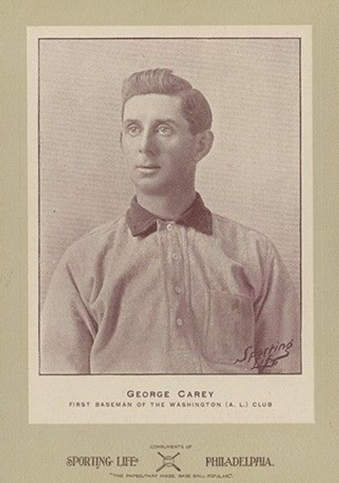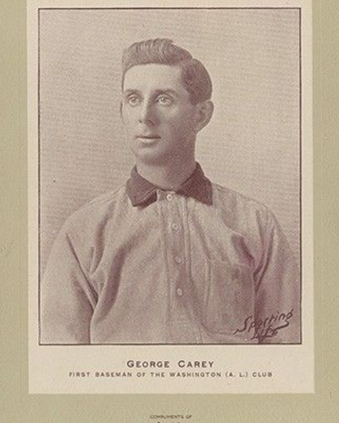May 20, 1900: Buffalo Bisons, Chicago White Stockings play on Sunday on rough, swampy grounds
“The [Pine Hill] grounds were in very poor shape … for when a man would go after a hard drive or a long fly his foot would, at the critical moment, drop into some slough and then the player would spend some few seconds in disentangling himself from the muss, and generally while this was being done a run would be scored.” – Buffalo Courier, May 21, 19001
 The Buffalo Bisons were in the American League in 1900, when it was a minor league, the year before it became a major league. Home games were played at Olympic Park in Buffalo. Because Sunday baseball was illegal within the city limits, the Bisons found an alternate venue for Sunday games. The Pine Hill section of neighboring Cheektowaga, New York, was rural yet easily accessible by trolley. A resort there owned by John Schwabl included a ball field and stands.
The Buffalo Bisons were in the American League in 1900, when it was a minor league, the year before it became a major league. Home games were played at Olympic Park in Buffalo. Because Sunday baseball was illegal within the city limits, the Bisons found an alternate venue for Sunday games. The Pine Hill section of neighboring Cheektowaga, New York, was rural yet easily accessible by trolley. A resort there owned by John Schwabl included a ball field and stands.
A son of German immigrants, Schwabl named his resort “Klein Deutschland” (Little Germany). It featured a hotel, restaurant, saloon, dance hall, bowling alley, picnic grounds, and zoo.2 A major draw for this and other Pine Hill establishments was the availability of alcohol on Sundays.3 Pine Hill developed a reputation for “wild and unseemly doings.”4 In modern parlance, it was a party town.
Schwabl’s baseball grounds were decidedly substandard, but Sunday baseball was a moneymaker and Bisons owner James Franklin was determined. The first game was scheduled for Sunday, May 13, 1900, against the Milwaukee Brewers.
Brewers manager Connie Mack visited the grounds that morning and was shocked by what he saw: “a cow field partially enclosed by a weather beaten and ramshackle fence.”5 “There was not even a diamond laid out in the water covered field,”6 and “the stands were in awful shape. … Not for $10,000 would I allow my men to play in that cesspool.”7
The game was canceled, but word did not reach thousands of fans who made the trip to Pine Hill. It was a boon for Schwabl and other local businesses, who entertained the visitors. “The pianos were kept rattling in rag time. Songs and dances by hoarse voiced men and half drunken women were interspersed,” reported the Buffalo Courier.8
On Saturday, May 19, a crowd of 1,200 saw the Chicago White Stockings defeat the Bisons, 7-5, at Olympic Park.9 A much larger crowd – estimated to be 2,500 – came to see them play at Pine Hill on Sunday, May 20. This time, the game was played, despite the deficiencies of the grounds. Schwabl’s outfield was all “hills, and swamps, and holes,” according to the Chicago Tribune. The diamond, “located on the side of a hill … was almost as lumpy and uneven as the outfield.”10
The White Stockings were owned and managed by Charles Comiskey. They compiled a 14-10 record through games of May 19 and were in third place in the eight-team AL. The Bisons, managed by Dan Shannon, were in seventh place with an 8-13 mark.
Comiskey’s lineup of May 20 included five major leaguers he had shrewdly picked from the four National League teams that disbanded after the 1899 season. From Louisville, he obtained Billy Hoy, a first-rate center fielder who was deaf. Walter “Steve” Brodie in left field was acquired from Baltimore. Second baseman Dick Padden, the team captain, came from Washington, and first baseman Tommy Dowd and catcher Joe Sugden from Cleveland. Comiskey’s starting pitcher was Frank Isbell, a 24-year-old right-hander.
Shannon’s lineup featured captain Billy Hallman at shortstop and first baseman George Carey, nicknamed “Scoops” for his ability to pick balls out of the dirt. The starting pitcher was Morris “Doc” Amole, a 26-year-old left-hander who had hurled a no-hitter at Detroit on Opening Day, April 19.11
The sole umpire on May 20 was Joe Cantillon. The game commenced at 3:30 P.M. with the temperature about 58 degrees.12 It was a high-scoring affair.
The White Stockings batted first. In the first inning, Brodie got aboard when Hallman failed to field his hit, and he scored when Fred Hartman sent a fly ball beyond the reach of Jocko Halligan in left field. The visitors collected four more runs in the second inning. Amole “lacked his usual speed”13 and was hit freely. Padden, Sugden, and Isbell stroked triples. In the fourth inning, with the bases loaded, Padden hit another triple, and the White Stockings led 8-0.
The Bisons rallied for six runs in the bottom of the fourth. They were helped by two errors committed by Hartman at third base. The big blow was Carey’s bases-loaded triple. Chicago’s lead was cut to 8-6.
Amole was taken out after four innings and replaced by Kid Carsey, a newly acquired 29-year-old right-hander. Carsey allowed six runs over the next three innings, as the White Stockings extended their lead to 14-6. In the sixth inning, with two outs and a man on, Padden lifted a fly ball that was pursued by Jake Gettman in center field.
Gettman “was about to clasp it in his mitt when he went into a bog and the ball rolled to the fence. By the time that Jake had gathered himself together Padden had scored,” observed the Buffalo Express.14 It was a bog-aided, inside-the-park home run, the only home run of the game. Chicago’s Herm McFarland drove a ball over the right-field fence in the seventh inning, but it counted as a ground-rule double because that fence was too close to home plate.
In the bottom of the seventh, the Bisons unleashed a nine-run assault on Isbell and his replacement, Willie McGill, and took a 15-14 lead. Halligan, Hallman, Carey, and Jack Shearon had two hits apiece in the inning. Errors were committed by Padden at second base and Frank Shugart at short. The Bisons added two more runs in the eighth, and Carsey pitched scoreless eighth and ninth innings to seal the victory. The final tally was Bisons 17, White Stockings 14.
The teams split the two remaining games of their series; both were played at Olympic Park. The White Stockings won the American League pennant in 1900. The next year, known as the White Sox, they were a charter member and the league champion of the now-major American League. The Bisons finished the 1900 season in seventh place. They were dropped by the AL after the season,15 and they joined the Class A Eastern League in 1901.
“Possibly some day the [Pine Hill] grounds will be good ones, if they are properly nurtured. At present they are a pretty tough proposition to ask a ball player to risk a limb on.” – Buffalo Courier, May 21, 190016
In the years that followed, John Schwabl invested thousands of dollars to turn the “one-time cow patch” into a “handsome” ballpark.17 And for a decade, it hosted many amateur and semipro teams, and occasionally the Bisons. After a long illness, Schwabl died at his Pine Hill home on September 25, 1912, at the age of 56.18 In 2024 his legacy endures at Schwabl’s German-American restaurant in West Seneca, New York, seven miles south of Pine Hill.
Acknowledgments
This article was fact-checked by Thomas J. Brown Jr. and was copy-edited by Len Levin.
Sources
“Chicago Was Beaten,” Buffalo Express, May 21, 1900: 9.
“Bisons Bat Out Victory,” Chicago Tribune, May 21, 1900: 4.
Ahrens, Art. “The Chicago White Sox of 1900,” SABR Baseball Research Journal, 1978. Accessed online at sabr.org/journal/article/the-chicago-white-sox-of-1900/.
Baseball-Reference.com and Retrosheet.org, accessed March 2024.
Image: 1903 Sporting Life cabinet card of George “Scoops” Carey.
Notes
1 “Buffalo Breaks Chain of Defeats,” Buffalo Courier, May 21, 1900: 9.
2 “Schwabl’s,” Buffalo Times, September 19, 1897: 8; “A Brief History of Schwabl’s,” Schwabls.com, www.schwabls.com/history, accessed March 2024.
3 “Sunday Not Exactly Dry,” Buffalo News, April 20, 1896: 1; “Many ‘Hotels,’” Buffalo Courier, May 4, 1896: 5; “No Effort Made to Enforce Law at Pine Hill Resorts,” Buffalo Courier, May 14, 1900: 7.
4 “Wild Scenes in and about Pine Hill Saloons,” Buffalo Enquirer, July 30, 1900: 8.
5 “Public Fooled at Pine Hill,” Buffalo Courier, May 14, 1900: 9.
6 “No Effort Made to Enforce Law at Pine Hill Resorts.”
7 “Three Hours of Boxing Is on the Olympic Club’s Programme,” Buffalo Enquirer, May 14, 1900: 4.
8 “No Effort Made to Enforce Law at Pine Hill Resorts.”
9 “Hooker Good, Fielders Bad,” Buffalo Courier, May 20, 1900: 26.
10 “Bisons Bat Out Victory,” Chicago Tribune, May 21, 1900: 4.
11 Sporting Life, April 28, 1900: 6.
12 “Hooker Good, Fielders Bad”; “Local Weather Forecast,” Buffalo Commercial, May 21, 1900: 10.
13 “Chicago Was Beaten,” Buffalo Express, May 21, 1900: 9.
14 “Chicago Was Beaten.”
15 Only four of the eight teams in the 1900 American League were in the 1901 American League: Chicago, Cleveland, Detroit, and Milwaukee. Buffalo, Indianapolis, Kansas City, and Minneapolis were replaced by Eastern teams in Baltimore, Boston, Philadelphia, and Washington. The Kansas City team was transferred to Washington.
16 “Buffalo Breaks Chain of Defeats.”
17 “Schwabl’s Grounds Will Be No More,” Buffalo Times, March 3, 1912: 72.
18 “John Schwabl Has Passed Away,” Buffalo Times, September 25, 1912: 5.
Additional Stats
Buffalo Bisons 17
Chicago White Stockings 14
Schwabl’s Pine Hill Grounds
Cheektowaga, NY
Corrections? Additions?
If you can help us improve this game story, contact us.


